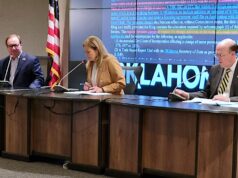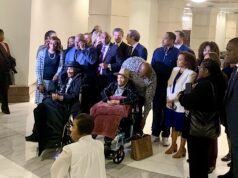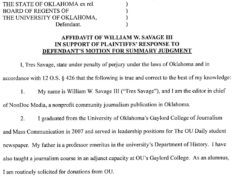(Editor’s Note: In honor of Sunshine Week, the following has been excerpted from OSU School of Media and Strategic Communications associate professor Joey Senat’s book, Mass Communication Law in Oklahoma, 8th Edition. Portions have been lightly edited.)
Oklahomans “are vested with the inherent right to know and be fully informed about their government.” The purpose of the Oklahoma Open Records Act is “to ensure and facilitate the public’s right of access to and review of government records so they may efficiently and intelligently exercise their inherent political power.”
“Openness in government is essential to the functioning of a democracy,” the state Supreme Court said in 2011. It further explained:
In order to verify accountability, the public must have access to government files. Such access permits checks against the arbitrary exercise of official power and secrecy in the political process. It gives private citizens the ability to monitor the manner in which public officers discharge their public duties and ensures that such actions are carried on in an honest, efficient, faithful, and competent manner.
The public records policies and procedures of government agencies “must be in the letter and spirit of the Open Records Act,” then-Attorney General Drew Edmondson said in 1999.
In 2002, Edmondson said the statute’s “statement of public policy establishes a presumption of openness.” Under the statute, all records of state and local agencies and officials are presumed open unless specifically exempted by statute. Any public official denying access to a record must prove that a statutory exemption applies if the denial is challenged in court.
“Undue burden on the agency is not, standing alone, an excuse nor does the burden of production transform an Open Record to a record that is not open,” the Court of Civil Appeals said in 2007. “The fact that information may be available from an alternate source, such as a court record, is neither an excuse nor a basis to redesignate an Open Record into a record that is not open.”
In ruling on records requests, public bodies and courts must consider that, given the intent of the Open Records Act, “disclosure is to be favored over a finding of exemption,” the Oklahoma Supreme Court said in 1986.
Oklahoma public agencies have a “duty” to provide records to the public.
“The purpose of the Act is ‘to ensure and facilitate the public’s right of access to and review of government records so they may efficiently and intelligently exercise their inherent political power.’ To fulfill this purpose the Act imposes a duty on a public body to ‘provide prompt, reasonable access to its records’ and make a person available to release records during the public body’s regular business hours.”
— Former Oklahoma Attorney General Drew Edmondson
The Open Records Act does not create a right of individual informational privacy that would block access to government-held information.
Instead, the statute says, “The privacy interests of individuals are adequately protected in the specific exceptions to the Oklahoma Open Records Act or in the statutes which authorize, create or require the records.” And unless a state or federal statute specifies otherwise, “persons who submit information to public bodies have no right to keep this information from public access nor reasonable expectation that this information will be kept from public access.”
Subsequent to the addition of that language in 1988, the Oklahoma Supreme Court said the statute doesn’t grant an individual the right to be notified that a record regarding the person has been requested.
For nearly all records containing both exempted and otherwise public information, the Open Records Act requires the release of “[a]ny reasonably segregable portion” after the exempt portion has been deleted.
Nearly 40 years of the Oklahoma Open Meeting Act
Oklahoma’s first statutes providing for open meetings were enacted in 1959. Significant changes were made in 1967 and 1971. The Open Meeting Act was enacted in 1977.
The Legislature’s goal in enacting the Open Meeting Act “was not simply to prevent or punish deliberate violations, but to restore sadly sagging public confidence in government, a goal which is hurt by every noncomplying meeting regardless of whether or not the noncompliance resulted from evil motives,” then-Attorney General Jan Eric Cartwright said in 1982.
The statute’s stated public policy is “to encourage and facilitate an informed citizenry’s understanding of the governmental processes and governmental problems.” As the Court of Civil Appeals noted in 2008, “The Act serves to inform the citizenry of the governmental problems and processes by informing them of the business the government will be conducting.”
Public bodies must act within “both the spirit and purpose of the Open Meeting Act,” Cartwright said in 1980. And while Robert’s Rules of Order may apply when the Open Meeting Act is silent, it cannot trump the statute’s requirements or prohibitions.
Because the Open Meeting Act was “enacted for the public’s benefit,” the Oklahoma Supreme Court said in 1981, the statute “is to be construed liberally in favor of the public.”
That means the statute “must be given a construction which will effectuate and not subvert the intention of the Legislature in facilitating an informed citizenry’s right to participate in government and understand why government acts affecting their daily lives are taken,” Cartwright had said in 1980.
It also means “the Act should be interpreted in such a way as to avoid establishing potential evasion loopholes,” he later said. As then-Attorney General Drew Edmondson explained in 2000, “a governmental body must operate with such openness that the citizenry is informed of its activities.”
The principle is “very simple,” the state Court of Civil Appeals has said: “When in doubt, the members of any board, agency, authority or commission should follow the open-meeting policy of the State.”
Audience members do not have a right under the Open Meeting Act or the First Amendment to speak on issues as part of the public meeting. The statute “nowhere provides for or guarantees citizens a right to participate in the governmental decisions being made at an open meeting,” Edmondson said in a 1999 opinion. “The Act is designed to enable citizens to be present and view the workings of government at open meetings, but does not require that citizens become participants at an open meeting or that they have a right to be heard at an open meeting.”
If the public body chooses to open the meeting to public comment, “it may only impose reasonable time, place and manner restrictions on expression which are content-neutral,” Edmondson concluded. “Any content-based prohibition must be narrowly drawn to effectuate a compelling state interest.”






















